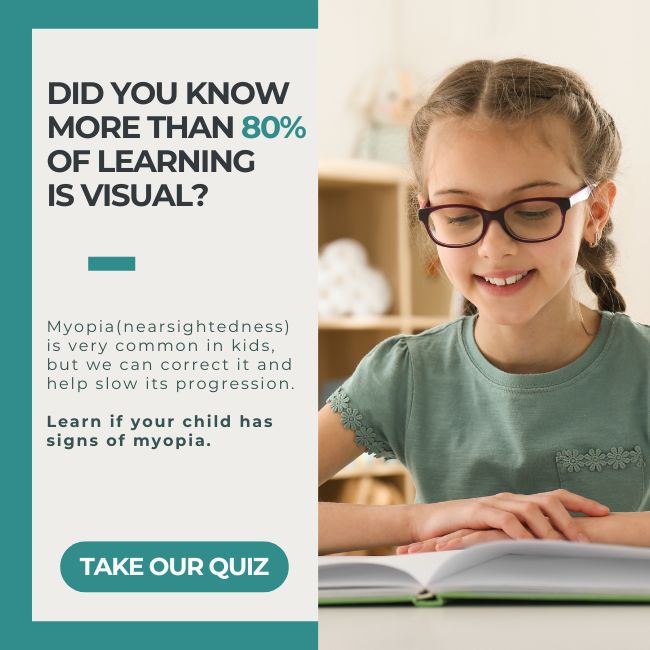Living with the long-term discomfort of dry eyes can be frustrating, and sometimes debilitating. While there are various treatments available, there’s growing evidence that our diet plays a key role in eye health. Omega fatty acids, and vitamins B12, C, E, and A can all contribute to the health of your tear film. Determining the root cause of your dry eyes with regular eye exams is the first step toward relief.
Common Causes of Dry Eyes
Dry eyes can be triggered by various causes:
- Environmental and Lifestyle Factors
- Digital Eye Strain
- Medical Conditions
- Hormonal changes
- Chronic sinusitis or allergies
- Diabetes
- Certain Medications
It’s important to identify and address the root cause of your dry eyes, as addressing these underlying issues will be integral to your long-term eye health.
The Role of Vitamins in Our Eye Health
Vitamins play a crucial role in maintaining healthy eyes by supporting various functions, from antioxidant protection to improved tear production. Certain vitamins and their associated minerals are known for promoting eye health, and incorporating them into your daily regimen may provide some relief from dry eye symptoms.
Vitamin A
Known as retinol when obtained from animal sources or beta-carotene in plants, vitamin A is vital for good vision, and a deficiency is linked to numerous eye problems, including dry eyes. It also helps to maintain the mucous membranes that protect the eye’s surface.
B-Vitamins
A complex of eight different vitamins, B-complex vitamins like B2 (riboflavin) and B12 are important for overall eye health.
Vitamin C & E
Vitamin E in particular has been studied for its role in increasing the tear film lipid layer, which can be beneficial for those with evaporative dry eye. Vitamin C can reduce or delay the onset of cataracts and has been shown to slow the progression of macular degeneration.
Omega-3 Fatty Acids
Though not vitamins in the strict sense, these essential fatty acids have been shown to decrease dry eye symptoms by reducing inflammation and supporting healthy tear production in addition to other health benefits.
Essential Sources of Eye-Healthy Nutrients
Identifying which foods contain these important vitamins and nutrients is the first step toward finding relief for dry eyes. Here are some great sources for each:
- Vitamin A: liver, eggs, sweet potatoes, spinach, and carrots
- B-Vitamins: whole grains, meat, eggs, legumes, seeds, and nuts
- Vitamin C: citrus fruits, strawberries, bell peppers, and kale
- Vitamin E: nuts, seeds, and vegetable oils
- Omega-3 Fatty Acids: fatty fish like salmon, mackerel, sardines, flaxseeds, and walnuts
The key to incorporating these nutrients into your diet is to focus on a wide variety of foods and ensure that a significant portion of your diet is made up of whole, unprocessed foods.
Supplements
While getting vitamins through your diet is the optimal route, sometimes it’s not possible to get enough of these important nutrients through food alone. Supplements can play a crucial part in ensuring you’re getting adequate levels of the vitamins and minerals necessary for healthy eyes.
Vitamin A Supplements
Be cautious with vitamin A supplements, as high doses can be toxic. The recommended daily allowance (RDA) for adult men is 900 micrograms (mcg) per day, and for adult women is 700 mcg per day.
B-Complex Supplements
Vitamin B supplements can be particularly helpful for vegetarians and people who have malabsorption issues. The RDA for most B vitamins isn’t very high, making supplementation an easy way to meet your needs.
Vitamin C & E Supplements
Both of these vitamins are very safe and easy to find in supplemental form.
Omega-3 Supplements
For those who don’t eat fish or find it hard to get enough omega-3s from their diet, a fish oil supplement can be beneficial. Look for one with high levels of DHA and EPA, the active forms of omega-3s.
It’s important to consult with a healthcare professional before starting any new supplement regimen, as they can interact with other medications or medical conditions.
Can Vitamins Make Dry Eyes Worse?
Just as vitamins can alleviate dry eye symptoms, some may worsen the condition when taken in excess. Excessive vitamin A can lead to a condition called hypervitaminosis A, which can cause an array of symptoms including dry eyes. Vitamin supplements are labeled with their amounts, which can be a useful way to control intake.
Additional Considerations
In addition to vitamins, other nutritional strategies can help manage dry eyes:
Hydration
Dehydration is a major player in dry eyes, so drinking enough water is always essential. Try to aim for eight 8-ounce glasses of water a day.
Beverage Choices
Limit caffeine and alcohol, both of which can contribute to dehydration and worsen dry eye symptoms.
Meal Frequency
Focus on eating balanced meals throughout the day to maintain consistent energy and hydration levels in the body.
Beyond Nutrition: Lifestyle Strategies for Dry Eye Relief
In conjunction with a nutrient-rich diet, there are various lifestyle changes and practices that can support your eye health and help manage dry eye symptoms:
The 20/20/20 Rule
Staring at screens can reduce your blink rate, contributing to dry eyes. Refer to the 20/20/20 rule, taking regular breaks to refresh your eyes.
Humidifier Use
Adding a humidifier to your home or office can help maintain optimal humidity levels and prevent the air from drying out your eyes.
Eye Protection
Wear sunglasses with 100% UV protection to shield your eyes from wind and sun, and consider protective eyewear when in dry or dusty environments.
Regular Eye Exams
Keep up with regular eye exams so that any issues with dry eyes can be identified early and treated appropriately.
Finding Relief
Our eyes are both a product and a mirror of our lifestyle and dietary choices. By maintaining a well-balanced diet, staying hydrated, and scheduling regular eye exams you can maintain your overall eye health.
An eye exam at Insight Eyecare can help identify the root cause of your dry eyes. Our friendly, experienced team can provide eye care for everyone in the family. Contact us today to schedule an appointment.







